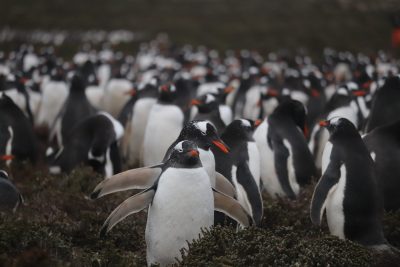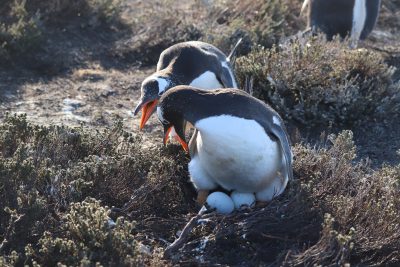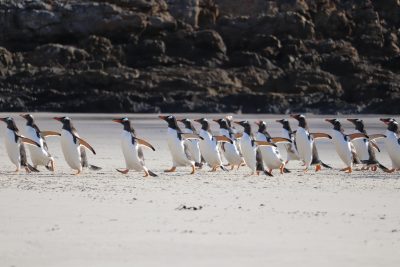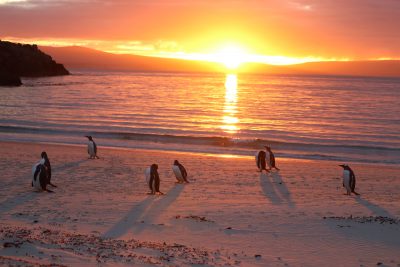For gentoo penguins, hemoglobin levels in the blood are vital for efficient diving and foraging—which in turn could impact breeding success

© Sarah McComb-Turbitt
The birth dates, and chances for survival, of these chicks are dependent on when their parents lay eggs — a factor reliant on the adults being able to forage and feed enough to have the energy to breed. A recent study published in the Marine Ecology Progress Series investigated if diving efficiency — which impacts the type and amount of food foraged — is associated with markers of oxygen storage and carrying capacities (aerobic capacities). The study then looked at if these markers are associated with pre-breeding foraging efforts and the penguins’ breeding statuses.
“We were interested in understanding how diving capacity — specifically how long gentoo penguins can stay at the bottom — is related to their aerobic condition,” said Marie Auger-Méthé, principal investigator and associate professor at the Institute for the Oceans and Fisheries. “Diving deep takes time and energy, and it’s useful only if the penguin can search and catch food at the bottom. We showed that penguins with higher aerobic capacities can spend more of their dive at depth than other penguins while still taking the same amount of time to recover.”
Diving is the key to these birds’ survival. While only 30 inches tall and 15 pounds, gentoo penguins can swim up to 22 miles an hour, the fastest of any diving bird. They exhibit a range of diving behaviours, preferring to shallow dive to preserve energy while their deep dives can reach depths of over 200 metres. They eat different types of squid, fish and krill, with larger, more energy-rich prey being found closer to the ocean floor.
While foraging is important for the survival and wellbeing of many animals, gentoo penguins have to increase their time on land to bond with their mate and maintain nesting sites before laying eggs. This means that successful food foraging during the pre-breeding season is absolutely essential for these birds as they prepare to expend energy to defend their nests and lay eggs. A penguin with plenty to eat will lay eggs sooner compared to unlucky counterparts, creating a higher survival rate for their own offspring. Gentoo penguins can lay up to two eggs per year, but some will skip a year and forage, choosing to replenish their health so they are able to better raise chicks in the future.

© Sarah McComb-Turbitt
So, what exactly impacts the gentoo penguin’s ability to dive and find food before breeding?
During a dive, the penguin’s effort can be measured by the trip duration, total time spent at sea and the vertical (dive) distance traveled. With larger prey found at the bottom, penguins that can dive deeper and longer have a better chance of feeding sufficiently. Hemoglobin (Hb), the protein in red blood cells that carries oxygen to all parts of the body, is a key factor for diving penguins. Penguins with higher hemoglobin levels dive more frequently at deeper depths (more than 140 metres) and can spend more time at these extraordinary depths. These penguins also don’t need to spend more time replenishing their oxygen stores, which means they can forage for food much more efficiently. They are able to find more food — and also better and rarer food — compared to other penguins, which reduces competition and saves energy.
Hematocrit (Hct) is the percentage of red blood cells in blood. It can also be a factor for diving capacities, as sometimes, a higher percentage of hematocrit may mean a higher amount of hemoglobin, which means more oxygen carrying capacities. However, a higher hematocrit doesn’t necessarily mean a better dive — having more red blood cells thickens blood, creating lower circulation and making the heart work harder to circulate the blood.

© Sarah McComb-Turbitt
“These kinds of studies are really important because while most research still tries to describe what a typical individual of a species does, we know that individuals vary drastically in their conditions, behaviour and reproduction,” said Auger-Méthé. “In some cases, there may not be a typical individual that represents the majority in a population. These differences can have a large effect on their resilience to human stressors, as some individuals may be hit harder than others.”
With gentoo penguins, human stressors can mean anything from climate change, fishing and tourism to pollution, invasive species and human development.
“Pollution from shipping, oil spills and other maritime activities introduce contaminants that penguins ingest and carry,” said McComb-Turbitt. “Commercial fishing, particularly for squid and fish, is also a significant industry in the Falkland Islands. Overfishing could impact the food availability, and consequently, a penguin’s survival and ability to reproduce.” Additionally, different types of fisheries can have varying effects on the penguins. Inshore overfishing may disproportionally impact penguins with low aerobic capacity, as they would not be able to reach fish in offshore waters.
These penguins, however, are resilient little creatures who use their flexible diets and diving capacities to quickly adapt to changes in their environments. The Falkland gentoo penguins are genetically different to their relatives in Antarctica, making future studies vital to understanding more about these fascinating animals.
Diving efficiency at depth and pre-breeding foraging effort increase with haemoglobin levels in gentoo penguins published in the Marine Ecology Progress Series

© Sarah McComb-Turbitt
Tags: biology, birds, energetics, faculty, Falkland Islands, foraging, hemoglobin, IOF alumni, IOF students, Marie Auger-Methe, penguins, reproduction, seabirds